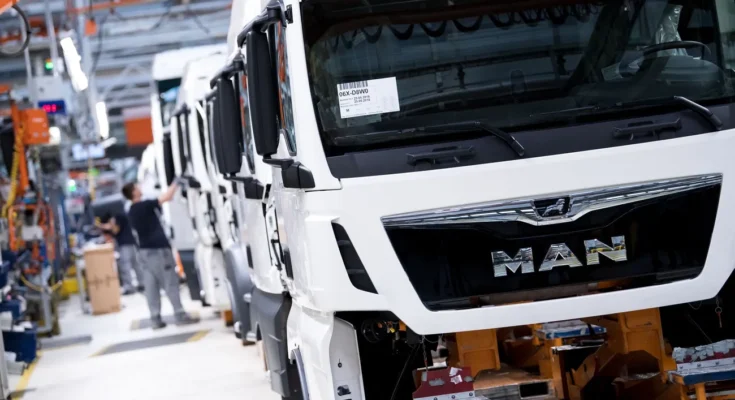The German automotive industry has had to face terrible news. Truck and bus manufacturer MAN has announced another round of layoffs, planning to cut around 2,300 jobs in Germany within ten years. Key locations were most impacted Munich with 1,300 jobs, Salzgitter with 600 jobs and Nuremberg with 400 jobs. IG Metall even gives slightly higher numbers and is concerned about the location in the long term.
New data from the Federal Statistical Office shows how severe the crisis is in key German industries. Based on this, at the end of the third quarter there was a decrease of 48,700 people working in the automotive industry compared to the previous year. The figure represents a decline of 6.3 percent – “higher than any other large industrial sector employing more than 200,000 people.” At 721,400 people, employment in the automotive industry fell to its lowest level since mid-2011.
The auto industry is suffering from sharp US tariff increases, falling global sales and Chinese competition, especially for electric vehicles. Recently there was also a problem with the delivery of chips from the Dutch manufacturer Nexperia. Statisticians explain that auto suppliers are even more affected by layoffs in the industrial crisis than manufacturers.
And the prospects for improvement are slim: Recently, many companies announced job reduction programs that will continue for the long term. These include industrial giants such as Bosch, ZF Friedrichshafen but also Mercedes and the VW Group with its brands, including MAN.
MAN wants to live without layoffs
In justifying the cost-cutting measures, MAN explained that the group must adapt to the continued weak truck market in Germany and further improve its cost position. In addition, high electricity and labor costs as well as increasing competitive pressures in Asia are also burdens. However, layoffs must be “completely socially acceptable,” a spokesperson said. There are no layoff plans. IG Metall and the works council strongly criticized the plan. In the long term, this puts the existence of the main plant in Munich at risk, says Sybille Wankel of IG Metall.
The union also assumes that the figure will be slightly higher than MAN. In the long term, he predicts a loss of 2,000 jobs in Munich and 500 in Nuremberg. Due to the relocation of production to Poland, the union was also concerned that work in the field of research and development would be outsourced to the parent company Traton.
IG Metall Bavaria boss Horst Ott announced that he will take over management of MAN. He strongly recommended that the board hold discussions and threatened escalation. Ott didn’t say exactly what it would look like, but emphasized: As IG Metall we have “the right tool for every problem. Which one we use is up to others.”
120,000 jobs lost in the industry
However, the automotive industry is not the only industry experiencing layoffs. According to the Federal Statistical Office, around 5.43 million people were employed in German industry as a whole at the end of the third quarter – a decline of 120,300 or 2.2 percent on year.
The data shows where the problems lie in German industry, said Sebastian Dullien, scientific director of the Institute for Macroeconomic and Business Cycle Research (IMK) at the Hans Böckler Foundation. Overall, the decline in employment was moderate compared to the decline in production and orders. “It is not too late to save the majority of jobs in the industry.”
Mechanical engineering also suffered
There were massive layoffs in other important sectors such as mechanical engineering, Germany’s largest industrial sector in terms of number of employees. The number of jobs there fell 2.2 percent to around 934,200 people at the end of the third quarter. Within a year, there was a slight decline in the chemical sector by 1.2 percent to 323,600 employees and in electrical equipment production by 0.4 percent to 387,500 employees.
Layoffs occurred mainly in the metal production and processing sector, amounting to minus 5.4 percent, and in the production of data processing equipment, electronic and optical products, amounting to 3.0 percent. According to statistics, the only major industrial sector that experienced employment growth was the food industry, with an increase of 1.8 percent to 510,500 people.
“Germany needs a holistic industrial policy”
Given the aggressive economic policies of the United States and China, Germany needs a holistic industrial policy, said economist Dullien. These two large countries want to increase domestic production. “This is detrimental to German industry,” Dullien said. “Germany should encourage the EU to define its own key sectors and use the internal market to promote European production in these sectors.”
© dpa-infocom, dpa:251120-930-316518/3



